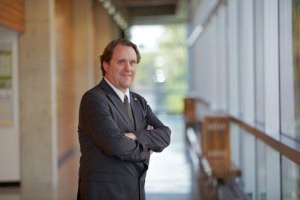
When Neal Davies left the University of Alberta 20 years ago, he was a fresh PhD grad, the LRT had barely crossed the river, and Dent/Pharm was still the home of Pharmacy. Since then, Davies has worked and studied at the University of Calgary, the University of Sydney, Washington State University, and most recently at the University of Manitoba. He returns to the U of A with international perspectives on pharmacy, a wealth of leadership experience, and a pining for Java Jive.
I sat down with the 8th dean of Pharmacy and Pharmaceutical Sciences to talk about what has changed at the U of A since he left, what hasn’t changed, what it means to be a dean, and where pharmacy is heading as a profession.
You’ve been back since September 1 — is it all starting to feel familiar again?
Parts are familiar. Obviously there’s lot of new buildings and new infrastructure, but I see some things that haven’t changed, too. HUB Mall hasn’t changed that much. It’s nice to see La Pasta is still there. I was sorry to see Java Jive isn’t there anymore — I frequented [Java Jive].
Obviously you’ve been busy in your new role. You’re still supervising graduate students, though?
Yeah, I still have a PhD student. In my last role as dean, I had several grad students. I keep my hand in research, still publishing… A dean is also a professor and a scholar. That doesn’t just end because you have the title, “Dean.” You can’t turn off that tap so quickly. There’s always ideas that you have that you’re pursuing.
Any specific ideas that you’re pursuing at the moment?
I’m into drug delivery, and we’ve been looking at some ways to deliver drugs through the lymphatics. When I was young and ambitious I wrote a book on anti-oxidants. I did a lot of work in that area, and I’m still doing some work in that area.
I’ve written more educational articles lately.
What kinds of educational articles?
Well, as you develop curriculums — and we’ve been expanding the scope of pharmacy practice — I ’ve always taken it to the next level, which is disseminating that kind of work.
Speaking of curriculum change, can you explain the recent move to the PharmD program?
It’s really a world-wide phenomenon. The US really took the lead. They changed the BsC Pharm to a PharmD by 2000. We’ve said in Canada we’ll do it by 2020. There are certainly other countries in the world that have PharmD programs, and the majority are moving that way.
What makes that shift so important?
Well, there’s tremendous changes [happening] in healthcare. I don’t even know how many thousands of drugs are on the market. [Pharmacy has] always been important, but there’s been a change in legislation in Alberta. Pharmacists have acquired more rights and responsibilities, and are legislatively able to do more. So we have to adapt our education. We actually have to be ahead of the profession, and be pushing the profession.
Probably the most visible thing that Albertans see is now you can go to your pharmacist and get your flu shot. We can take on new roles. We don’t have to be stagnant. We’re trying to evolve with the needs of healthcare.
So where do pharmacists fit into the healthcare team now?
A pharmacist is a medication expert. Just looking up something, which people can do, it can give them some information, but a pharmacist can help to put that into perspective.
Though [it’s] slow to change, I think we’re working better in teams. Many physicians are very appreciative of the knowledge that pharmacists have, and nurses have. We have some overlap in our scopes, but we also have some unique knowledge training that we need to share back and forth for the benefit of patients.
Is this connected to the broader push towards experiential learning?
Yeah. In the new PharmD program, we’ve almost gone full circle. We’ve been around since 1914, and back then, you were an apprentice first, and then you came into university to learn the knowledge. So after a hundred years, we’re training them in the knowledge for the first three years in pharmacy school. We’re embedding some experiential [learning] early on, but that whole last year is out there, trying to utilize the knowledge base. That is a huge change in this program.
What’s on your radar for your first year as dean?
Well, I think we’re in pretty good shape, but there are always things to optimize. I think a good leader sits back and listens, and tries to get a good lay of the land, and doesn’t make too many changes too quickly.
We have to chart a new strategic plan, just like the president had to do. A good strategic plan comes from the bottom up, not the top down. So I’m trying to get to know my faculty — you know, have one-on-ones with each faculty and each staff — and trying to listen to them, and hear their concerns or things that they would like to have changed.
And then we have comprehensive accreditation that we have to undergo. So those [two things] are very high on my list.
Then, it’s working in the trenches.

This interview has been edited for length and clarity.